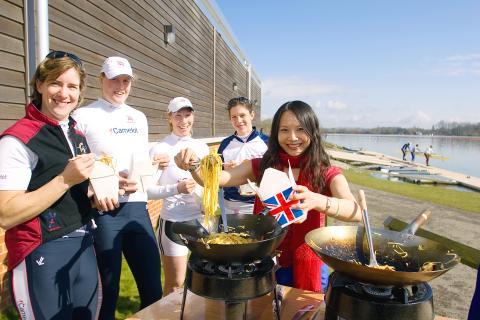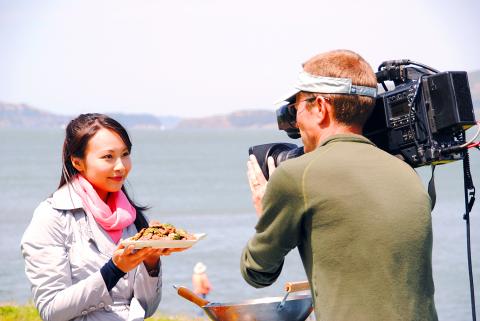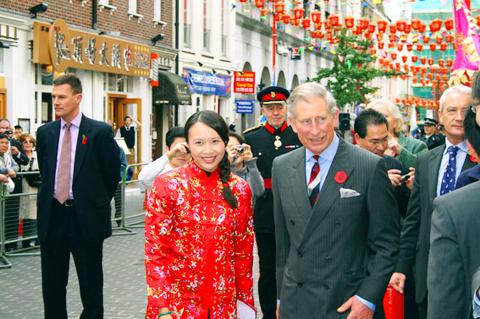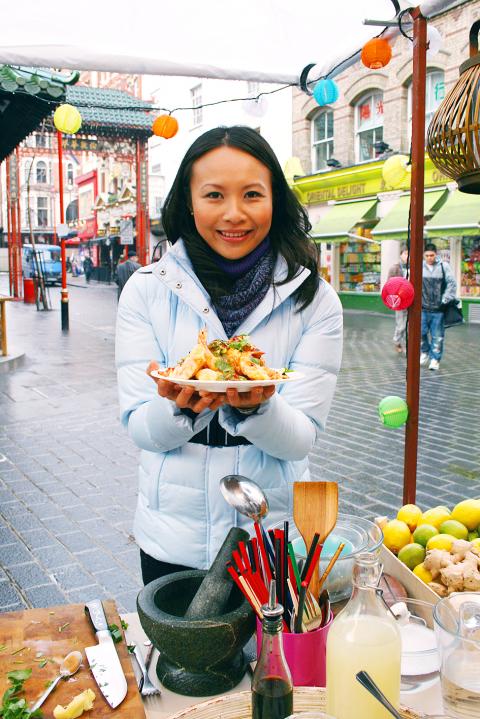Asked to name a famous Taiwanese, some Britons might mention Ang Lee (李安). Sports fans could add golf star Yani Tseng (曾雅妮). And more than a few might confuse Taiwan and Thailand. However, millions would recognize Ching-he Huang without having a clue that she was born in Taipei and lived in Greater Tainan until the age of five, before moving to the UK aged 11.
Over the course of the last decade Ching has established herself as one of Britain’s most successful television chefs. Her breakthrough came in 2005 with a show called Ching’s Kitchen on the Good Food Channel before her profile received a massive boost after her Chinese Food Made Easy series aired on the BBC in 2008. Among more recent shows was Exploring China: A Culinary Adventure, another BBC project, licensed worldwide, in which she teamed up with renowned US chef Ken Hom.
In one episode she visits her parents, who returned to Taiwan in 2009, taking an emotional trip to Greater Tainan’s Baihe (白河) District, where her mother’s family come from and where she and her brother spent their early years. In her late grandmother’s kitchen she cooks a meal for family members including her grandfather, a bamboo farmer who also owned an orangery.

Photo Courtesy of Lion TV
When the Taipei Times caught up with Huang, the roles were reversed, with her parents visiting London and her mother preparing zongzi (粽子, glutinous rice wrapped in bamboo leaves) for Dragon Boat Festival.
RURAL UPBRINGING
“I was brought up on my grandmother’s farm, watching her kill chickens, gut fish, all of that stuff,” Huang recalls of her early childhood. “Everything was very rural. I remember my grandfather going to the nearest market every day, the local wet market, and taking whatever he’d harvested of oranges and bamboo shoots to go and exchange for things like fresh fish or fresh tofu, fresh noodles, that sort of thing.”

Photo Courtesy of LION TV
Her time in Baihe sparked a love of food and cooking that would eventually see her become a familiar face on TV screens in Britain and beyond.
“All my memories are about food. When I woke up my grandmother would make us breakfast and then after breakfast she’d start preparing for lunch … she’d be cooking the whole day,” Huang says. “At the time we’d hinder her by playing and running around and seeing what she was up to or playing with the chickens in the garden in the back.”
At the age of five Huang moved to South Africa, where her father set up a bicycle business importing and exporting parts from Taiwan, but in 1989 as the political situation there became tense, he decided to move his family to London. It was an unusual choice, as Taiwanese emigrants traditionally favor the US or Canada.

Photo Courtesy of Jamie Cho
“All his friends were going to America and he did go out on exploratory trips to America, but my father had grand ideas,” Huang says. “He liked to be different, he didn’t like to follow the crowd, and he’d heard of Oxford and Cambridge and he thought ‘I’d love my children to go to Oxford or Cambridge one day.’ So the education was seen as better here in the UK.”
ENTHUSIASM FOR EATS
In the end, Huang earned a degree in Economics from the University of London instead, before tapping into her passion for food and setting up a catering company.

Photo Courtesy of Jamie Cho
“At first I was just producing noodles and jacket potatoes for offices in a small office block that had a spare kitchen,” she says. “It so happened that we knew a Taiwanese lady and I struck up a relationship with her. She gave me three months free rent. I’d say she was my guiren (貴人),” she said referring to a term applied to a benefactor.
It was a break that Huang, fresh out of university and desperate to forge a path for herself, made the most of. At the time, her now sister-in-law was working in public relations and suggested Huang should try to promote her increasingly successful business.
During a meeting with a commissioning editor she was encouraged to do a screen test that went well enough for her to end up making regular appearances on a live cookery show and ultimately star in her own series.
Television wasn’t all glamor though.
“It was exciting, but it was also hell,” Huang says. “If you can imagine three weeks of six till midnight days, it was exhilarating, but I was filming all day and then coming back and having to prepare for the next day and having to test some of my recipes at night because I wasn’t confident of them or having to tweak something. So it was a lot of hard work and at the same time I was running my business.”
The long hours paid dividends though, and she is now one of a relatively small number of Asian TV chefs on British TV, considering the huge number of Chinese, Indian and other restaurants offering Asian cuisines in the UK. However, the situation is changing.
“There could be more [Asian TV chefs],” Huang says. “I’ve been very lucky to have the opportunities I’ve had, but you see more and more Asian cooks coming up now doing their thing … I think everything is opening up.”
In recent years she has filmed a number of series for US television and was nominated for a daytime Emmy as best culinary TV host last year. Her latest project, Restaurant Redemption saw Huang travel across the Atlantic to offer advice to failing restaurateurs and she is shooting a second series this summer.
DISPELLING STEREOTYPES
Despite her phenomenal success, her mission to pass on her love of Chinese cuisine continues unabated and she strives to present it in innovative ways as well as battling certain Western stereotypes.
A conversation between two young women at San Francisco airport sticks in Huang’s memory. The pair were discussing eating options for the weekend but Chinese food was ruled out as “greasy and unhealthy.”
“It’s terribly sad, it’s kind of dismissing a whole culture based on it, so I’d like to dispel that,” Huang says, pointing out that a lot of Chinese eateries in the West are basically fast food restaurants selling mainly fried dishes, so people tend not to order balanced meals.
“I try to find ways of reinventing the food to keep it current, to keep the conversation going, to keep people interested in the subject,” she says. “I try to be a good teacher because I try to think about all the teachers who have taught me and I think, well, they always tried to reinvent things or do things in different ways to keep my interest and I guess that’s what I have to do.”
Huang visits Taiwan at least once a year to see family, but a trip to a night market is high on her list of things to do once she steps off the plane.
“I love Taiwanese street food ... stinky tofu … tofu pudding, salty crispy chicken, oyster omelet, all the usual Taiwanese snacks,” she says.
There is no hesitation in choosing her favorite Taiwanese food though.
“Nothing gets close to my grandmother’s zongzi,” she says.
Asked what projects she would like to work on in the future, her thoughts return to her roots.
“I’d love to do something [on Taiwan],” she says. “I think there’s so much to be shared, the stories, the history, the culture, the food. Taiwan has the most amazing produce, the most amazing variety of fresh fruit, vegetables and recipes.”

One of the biggest sore spots in Taiwan’s historical friendship with the US came in 1979 when US president Jimmy Carter broke off formal diplomatic relations with Taiwan’s Republic of China (ROC) government so that the US could establish relations with the People’s Republic of China (PRC). Taiwan’s derecognition came purely at China’s insistence, and the US took the deal. Retired American diplomat John Tkacik, who for almost decade surrounding that schism, from 1974 to 1982, worked in embassies in Taipei and Beijing and at the Taiwan Desk in Washington DC, recently argued in the Taipei Times that “President Carter’s derecognition

This year will go down in the history books. Taiwan faces enormous turmoil and uncertainty in the coming months. Which political parties are in a good position to handle big changes? All of the main parties are beset with challenges. Taking stock, this column examined the Taiwan People’s Party (TPP) (“Huang Kuo-chang’s choking the life out of the TPP,” May 28, page 12), the Democratic Progressive Party (DPP) (“Challenges amid choppy waters for the DPP,” June 14, page 12) and the Chinese Nationalist Party (KMT) (“KMT struggles to seize opportunities as ‘interesting times’ loom,” June 20, page 11). Times like these can

JUNE 30 to JULY 6 After being routed by the Japanese in the bloody battle of Baguashan (八卦山), Hsu Hsiang (徐驤) and a handful of surviving Hakka fighters sped toward Tainan. There, he would meet with Liu Yung-fu (劉永福), leader of the Black Flag Army who had assumed control of the resisting Republic of Formosa after its president and vice-president fled to China. Hsu, who had been fighting non-stop for over two months from Taoyuan to Changhua, was reportedly injured and exhausted. As the story goes, Liu advised that Hsu take shelter in China to recover and regroup, but Hsu steadfastly

You can tell a lot about a generation from the contents of their cool box: nowadays the barbecue ice bucket is likely to be filled with hard seltzers, non-alcoholic beers and fluorescent BuzzBallz — a particular favorite among Gen Z. Two decades ago, it was WKD, Bacardi Breezers and the odd Smirnoff Ice bobbing in a puddle of melted ice. And while nostalgia may have brought back some alcopops, the new wave of ready-to-drink (RTD) options look and taste noticeably different. It is not just the drinks that have changed, but drinking habits too, driven in part by more health-conscious consumers and